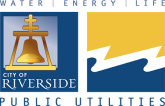Saving water and using water wisely has become extremely important as we continue to see significant dry periods and dry conditions across the region. Learn about some simple water-saving tips to incorporate into your everyday habits.
Indoor Water Efficiency Tips
Looking for ways to save water? Here are 10 ways to help you start saving water indoors today:
- Replace older, inefficient toilets with a WaterSense labeled high efficiency toilet. Older toilets can use up to 4 times more water per flush.
- Regularly check for & repair leaks. Even small leaks can waste hundreds to thousands of gallons of water a month. Many leaks can be fixed by a do-it-yourself plumber, and repair parts are relatively inexpensive to purchase ($5-20).
- Wash only full loads. The average American household uses about 23% of its water running the clothes and dishwasher.
- Let your dishwasher do the work. An average dishwasher uses about 10 gallons per load. Running the average faucet for just four minutes uses the same amount of water.
- Take shorter showers. Each minute you shave off your shower time saves up to 2.5 gallons.
- Install a high efficiency showerhead, and you could save an about 1 gallon per minute.
- Install an aerator on your bathroom or kitchen faucet and save about 1 gallon per minute. An aerator reduces the flow from the faucet, and uses air to maintain good water pressure.
- Turn the faucet on only to rinse when brushing your teeth, washing your hands or shaving. You will save up to 2.5 gallons a minute.
- Know where your master water shut-off valve is located. This could save water and prevent damage to your home.
- Select an Energy Star-approved clothes washer next time you purchase a new washer. They use 15-20 less gallons of water per load, and you will see savings on your energy costs too.
When it comes to conserving water, small adjustments can make a big impact. Conserve water with ideas from 100+ water-saving tips.
Outdoor Water Efficiency Tips
Over 50% of residential water use is outdoor landscape watering. Keep these five basic waterwise tips in mind to save water in your yard and garden.
- Know when to water. Water early in the morning (before 10a.m.) or later in the evening (after 6 p.m.) when temperatures are cooler and evaporation is minimized.
- Know how much to water. The amount of water needed each week changes with the weather. Different plants have different water needs, as well. Learn about plants that require less water and start incorporating them into your landscape.
- Water thoroughly, and less frequently to develop a more robust root system. Plants that have larger root systems are more effective at accessing water and need to be watered less frequently. Many established landscapes and lawns need to be watered one or two times per week. Newer plantings, vegetables, and potted plants may need more frequent watering. Creating a watering schedule will help ensure that your plants get the right amount of water each week.
- Prevent runoff by applying only the amount of water your soil can absorb. Much of the soil in our area is clay which means it holds onto moisture, but takes longer to absorb. If puddling occurs when you water, try breaking one long watering session into several shorter ones. For example, instead of watering for 20 consecutive minutes, run sprinklers in four 5-minute sessions. This will allow water to soak into the soil and minimizes runoff.
- Add compost or mulch to your soil to help it absorb and store water. Organic mulches (e.g. aged manure, bark chips, wood chips) cover and cool the soil, minimizing evaporation, soil erosion, and weed growth. Composted food scraps and plant debris from your garden (e.g. grass clippings, fall leaves) provide nutrients for your plants and increase the water-holding capabilities of your soil. Both are important for the health and well-being of your plants and can also reduce your water usage.
-
Recycle indoor water to use on plants
-
Refrain from watering landscape when it rains
-
Replace your grass/turf with water-wise plants
-
Use a broom to clean driveways, patios, and sidewalks instead of water from a hose
RPU is here to help with our water and money-saving rebate programs.
